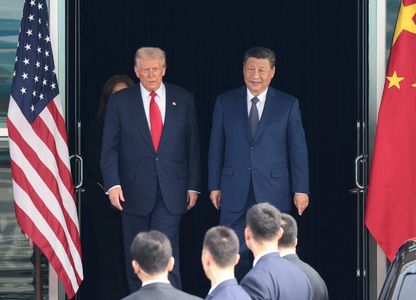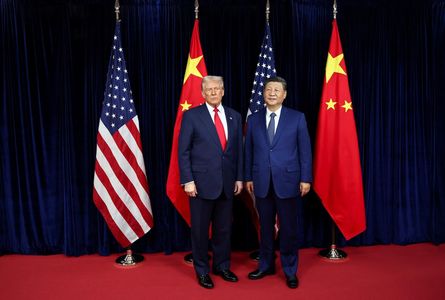President Trump is back in Washington, where tempers are flaring on Capitol Hill as millions of Americans are on the brink of losing critical federal assistance. The panel discusses whether the president will get directly involved in the shutdown fight.
Clip: Which side will face more political pressure to end the shutdown?
Oct. 31, 2025 AT 8:29 p.m. EDT
TRANSCRIPT
Notice: Transcripts are machine and human generated and lightly edited for accuracy. They may contain errors.
Vivian Salama: I do want to turn to the shutdown, the government shutdown, which, as of November 5th, will be the longest in American history. And tempers are flaring. President Trump got back to Washington to growing anger over this shutdown. Here's Senate Majority Leader John Thune this week.
Sen. John Thune (R-SD): People should be getting paid in this country. And we've tried to do that 13 times and you voted no 13 times. This isn't a political game. These are real people's lives that we're talking about. And you all have just figured out 29 days in that, oh, there might be some consequences?
Vivian Salama: So, in a lengthy Truth Social post early Friday, President Trump laid out to the blame on Democrats and said that Republicans should, quote, play their trump card and go for what is called the nuclear option to get rid of the filibuster and get rid of it now.
Paul, just explain to viewers exactly what he's calling for here when he talks about the nuclear option.
Paul Beckett: We're all about nuclear.
Vivian Salama: There seems to be a theme.
Paul Beckett: A nuclear option would be ending the filibuster. The filibuster essentially ensures that vast majority of votes in the Senate requires 60 votes. And if you ended the filibuster, it would go down to 51-50, and that would be a mechanism by which the Republicans would be able to push ahead with their version of what it would take to end, you know, more about this. Am I right?
Seung Min Kim Yes, that's absolutely correct.
Paul Beckett: Okay. Thank you.
Seung Min Kim: You're doing great.
Paul Beckett: And so that would be the question, right? It would be if you end that. But the Republican leadership in the Senate doesn't want to end it. Neither party likes in the Senate wants to end it. Joe Biden tried over voting rights legislation, and I think Joe Manchin and Kyrsten Sinema opposed it. So, there's very little appetite in the Senate for ending this procedure and the procedure's there so that they're kept in check a bit. So, you don't absolutely have these huge swings and it's I think it is very caught up in their sense there's a sort of civilized, deliberative body that they are.
Vivian Salama: Jeff, there's some very real world impacts that are coming in the next few days that you and I, again, we were at the White House yesterday when vice President Vance was talking about the air traffic controllers missing a salary. What else can we expect in the coming days?
Jeff Mason: Well, and one thing that he talked about was also the threat to Thanksgiving travel, which is just a few weeks away. We're just getting into November. And the sort of catastrophic consequences that that could lead to if air traffic controllers are not showing up.
The other real world consequences involve nutrition assistance. There are a couple different programs that are affected. There's the SNAP program, also known as food stamps, which nearly 42 million people are on. 39 percent of those are children. There's the Women Infant and Children Program which is also affected. The White House has said that they're going to use some money from tariffs to help fund that, but hasn't provided details. And there's also HeadStart, which provides preschool and education services for lower income children all across the country.
Vivian Salama: Also, of course, big questions about the Affordable Care Act.
Jeff Mason: And the Affordable Care Act, which is what the Democrats have been hanging their hat on throughout this shutdown, warning about the impact of dramatically increases in premiums and the cost of healthcare. And that will happen as well if the shutdown -- if they don't come up with an agreement and the shutdown doesn't end.
Andrea Mitchell: I think that the air traffic control issue and the pressure from two major airlines this week to come up with a solution and end this thing is going to increase pressure a lot on the Democrats. You begin to feel this when you talk to some of the senators that they think they've been winning on this, their polling tells them that they've been winning, that it's popular, but as these pressures and they become more consumer pressures and they get blamed, even yesterday there was huge weather interruptions on air travel, and it was immediately blamed on the shutdown, when it really was a weather interruption on a lot of the cancelations. I was traveling yesterday and I can just tell you it was a nightmare yesterday. But on Thursday in New York City, in particular in the northeast, and there's been a lot of weather on the East coast lately.
But the pressure, I think, is going to mount as we get closer to this deadline, especially the food assistance. They are managing to come up with money for the military, billions of dollars, to pay the military by transferring money from other accounts without Congressional appropriators, even with the objection, by the way, of some of the Republican appropriators in the Senate that they, again, the president is doing things with money that is not permitted under the law.
Vivian Salama: Seung Min, you cover the White House, you've also covered the Hill for many years. How much is politics at play? Obviously, we know politics is at play, but we have elections coming up in a few days' time. How much is that factoring into how both parties want to proceed, whether or not they decide to actually negotiate for real?
Seung Min Kim: Well, Virginia is really the state to look at if you're kind of looking in the context of shutdown politics, because, clearly, Northern Virginia has the highest population of federal workers. But I'm a little less convinced that the shutdowns or that the elections on Tuesday will specifically play a Democratic strategy here.
I do think that there are signs of some movement towards actually ending a shutdown earlier this week, and I saw, especially with small groups of bipartisan senators meeting to actually try to find a way forward. There's no deal yet. There's no official gang yet to end this. But the fact that there are actual talks and discussion happening is much more of an encouraging sign than we've seen in shutdown.
But as it relate as it pertains to Tuesday, I think Abigail Spanberger, who's the Democratic candidate in the governor's race there in Virginia, has made this -- has made her campaign much more broader when it comes to the Trump administration's assault on the federal government. And I think that's going to be the takeaway that Democrats have if she wins on Tuesday, as the polls indicate she will, that his -- that in part that what the president has done to the federal government and how he's sort of systematically dismantled it is not popular, particularly in Virginia.
Vivian Salama: We have just over a minute left, but how likely is it that President Trump gets involved? He's been relatively hands off.
Seung Min Kim: Right, and that's by design. I think he gets involved when there's a need for him to get involved. And that need is going to come when Republican leaders tell him that, okay, you need to come and do something about this. Because Republicans have actually been fairly consistent, you know, from Trump on down that all you need to do to end the shutdown is for Democrats to vote for this funding bill that's already passed the House. And that calculus, that line from Republicans hasn't changed as of this point.
Vivian Salama: We have a little over 30 seconds left. Andrea, you've covered this town for a little bit. How unusual is it for a president to leave the country, not once actually, but twice, including this one, this last trip, which was the longest that he's taken so far during a government shutdown?
Andrea Mitchell: It is unusual, not unprecedented. Other presidents have canceled trips. But he clearly thought that the China issue and being on the world stage was more important. And he's not playing a role in this.
Jeff Mason: Also he's not making deals when he promises or portrays himself as a dealmaker-in-chief. He did that in Asia. He's not doing it at home, at least not yet.
Vivian Salama: Very interesting. Well, we will continue to watch this, of course, and we're going to have to leave it there.
Thank you so much to our guests for joining me, and thank you at home for watching.
FROM THIS EPISODE


Clip: Trump's trade deals in Asia and threats to resume nuclear testing


Full Episode: Washington Week with The Atlantic full episode, 10/31/25

© 1996 - 2026 WETA. All Rights Reserved.
PBS is a 501(c)(3) not-for-profit organization
